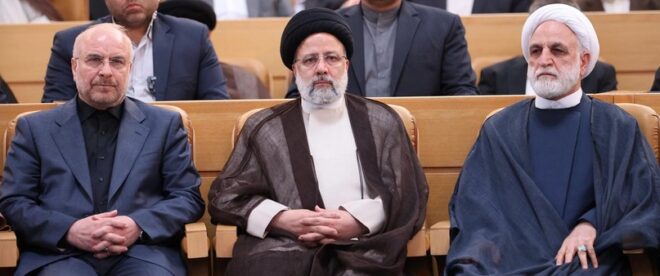iranintl – Iranian President Ebrahim Raisi and his ultraconservative allies are likely to present three different lists of candidates for the parliamentary elections in March.
This move seems aimed at creating an overwhelming propaganda push to secure a parliament dominated by Raisi’s supporters, ensuring minimal opposition to their complete takeover of the executive and legislative powers. Some social media reports also suggest an effort to replace Judiciary Chief Gholamhossein Mohseni Ejei with an ultraconservative figure, further consolidating power.
A “political purification” push has already begun, with all regime loyalists outside the circle of hardliners being purged from managerial and even teaching positions.
Abdolreza Davari, an aide to former President Mahmoud Ahmadinejad has alleged that Iranian state television plays a pivotal role in this “political purification” project, with Ejei not immune to the attempts to eliminate anyone not closely aligned with the ultraconservative Paydari Party.
Meanwhile, Khabar Online website in Tehran revealed that the Raisi administration is preparing three lists of ultraconservative candidates to overwhelm voters. The website said that the Strategic Network of Friends of Revolution [Persian acronym SHARIAN] led by Roads and Urban Planning Minister Mehrdad Bazrpash will be the leading group among the three.
While Raisi and his associates deny any concerted efforts to influence the upcoming elections, political figures linked to Paydari confirm re-branding and renaming of ultraconservative groups in preparation for the elections. The deliberate tactic is aimed at confusing voters, who may have lost trust in ultraconservative politicians over the past four years due to inefficiency and opposition to nationwide protests in 2022.
Nonetheless, political figures close to Paydari, such as Esmail Kowsari have confirmed that groups linked to Paydari have been re-branding ahead of the elections. Other reports have indicated that re-branding and name changes among ultraconservative groups are likely to confuse the voters.
Ultraconservative leaders know that their likeminded politicians have lost the nation’s trust in the course of the past four years both in terms of the inefficiency of their representatives in the parliament and in the government and as a result of their violent reaction to the nationwide protests that shook Iran in 2022.
Ultraconservative politicians may be also hoping that the same groups under different names can be attractive for voters particularly if they come up with generous pledges to voters, although unmet promises about building four million homes, reducing employment and controlling inflation in the past two years have made people numb to any rosy promises.
Politicians and political analysts in Tehran do not hide their concern about yet another drop in election turnout after the disgraceful low turnouts in the parliamentary elections of 2020 and presidential elections of 2021, the lowest since 1979. In some districts just around 20 percent of voters cast ballots. However, Iran’s reformists and moderates who were barred from running in those elections and are likely to be barred again in March, maintain that the ultraconservatives favor a low-turnout election as it would guarantee their win despite the embarrassment for the regime.
According to Khabar Online, politicians in Tehran have said that Paydari will coordinate its lists with Raisi. Moderate conservatives have already nicknamed groups such as SHARIAN as “Raisi’s proxy groups.” Salman Zakeri, a lawmaker from Urmia in northwestern Iran, says the idea of proxy groups is also meant to cover up the discords among the ultraconservative groups. He argued, “It is strange that they have a unity Council, and still they are divided into at least three groups.”
In another development, while all of these tactics ahead of the elections are part of the campaign toward political purification, Expediency Council member Mohammad Sadr is adamant that “The idea of political purification has been wrong from the start.” He stated, “When we talk about different shades of ultraconservative, it proves that there is no consolidated ultraconservative government.”
 Shabtabnews In this dark night, I have lost my way – Arise from a corner, oh you the star of guidance.
Shabtabnews In this dark night, I have lost my way – Arise from a corner, oh you the star of guidance.



